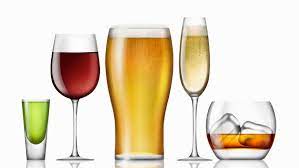There's no debate: Keeping your heart healthy should be a top priority as you age. According to Dr. Fahmi Farah, MD, the owner of Bentley Heart Center in Fort Worth, Texas, a heart surgeon at Baylor Scott & White All Saints Medical Center, and the co-founder of the Global Health Alliance Foundation, there are a few risk factors that could lead to heart-related ailments, including "hypertension, which is high blood pressure, hyperlipidemia, which is high cholesterol, diabetes, smoking, excessive alcohol drinking, stress, inactivity, and a family history." Out of that list, alcohol is a factor that raises a few questions—especially since many of us have likely heard that some alcoholic beverages, when consumed in moderation, might actually bolster heart health. This leads to yet another question: Are certain alcohol types more or less harmful to your ticker? Here, Dr. Farah explains how the type of drinks you consume impacts your heart health and why.
No type of alcohol improves heart health.
Red wine is an alcoholic beverage with a good report, namely because it contains flavonoids, which are known to boost the gut microbiome. But this drink, and other types of alcohol, won't actually improve heart health. "The detrimental effects of the alcohol outweighs [the benefits]," Dr. Farah says, noting that a global study on the matter, published in 2018, summarized that no amount of alcohol could be considered "good for you." Still, there are some types that could do more harm than good. "The stronger the alcohol, the more damaging," she shares, noting that hard liquor, like vodka, can cause more health issues down the line. And the same thing goes for quantity, she explains: The higher amount of alcohol consumed, the greater the detrimental impact could be.
Binge drinking could have an even more harmful impact on the heart.
Binge drinking, as defined by the Centers for Disease Control and Prevention, is a pattern of alcohol consumption that brings someone's blood alcohol concentration (BAC) to 0.08 g/dl or higher. The CDC explains that this can occur when men consume five or more drinks or when women consume four or more drinks in about two hours. Dr. Farah says that people who binge drink, even if they don't drink alcohol on a regular basis, could be at risk for heart attack or failure. "Heart failure is a condition where the pump in the heart gives out," she says. "That can reduce somebody's life expectancy and, of course, the quality of life, as well (including shortness of breath and swelling in their legs)."
Alcohol can weaken the heart.
"The detrimental effect of alcohol is that it basically weakens the heart muscle itself. And when it weakens the muscle, it basically doesn't pump as well anymore," Dr. Farah says. "It also has an impact on the atherosclerosis process, which is the plaque building process." In turn, those who drink alcohol excessively could start building blockages; these could cause other metabolic issues, such as weight gain and an electrolyte imbalance in the body—and both impact the heart.
Avoid alcohol if you've experienced heart failure.
Those with specific heart conditions should avoid drinking alcohol altogether. "We don't want our heart failure patients to be consuming any amount of alcohol," Dr. Farah says. For those with any other heart-related conditions, the key is to consume in moderation. "It's not to say that no one is ever going to have alcohol, that's unrealistic," she adds. "For those who occasionally enjoy their glass of wine, that's okay." Maintain other practices for the best heart health: Have a heart-healthy diet (Dr. Farah suggests the Mediterranean diet), exercise, manage stress, avoid smoking, and avoid excessive alcohol consumption..






No comments:
Post a Comment